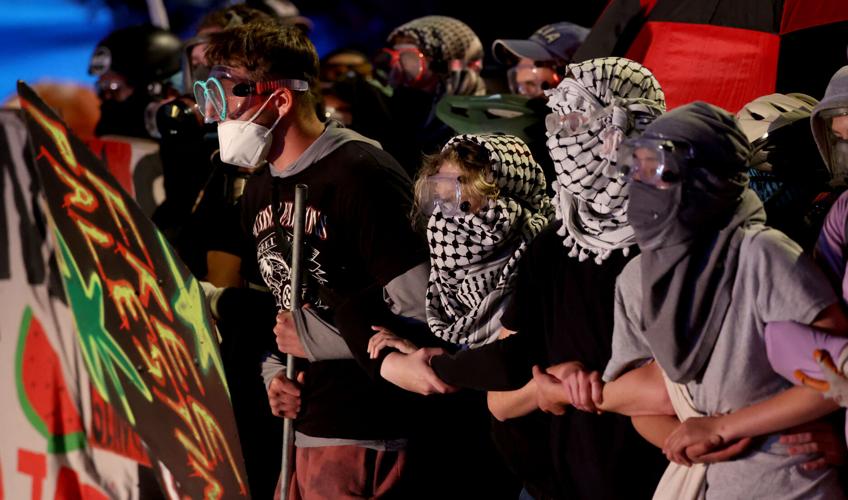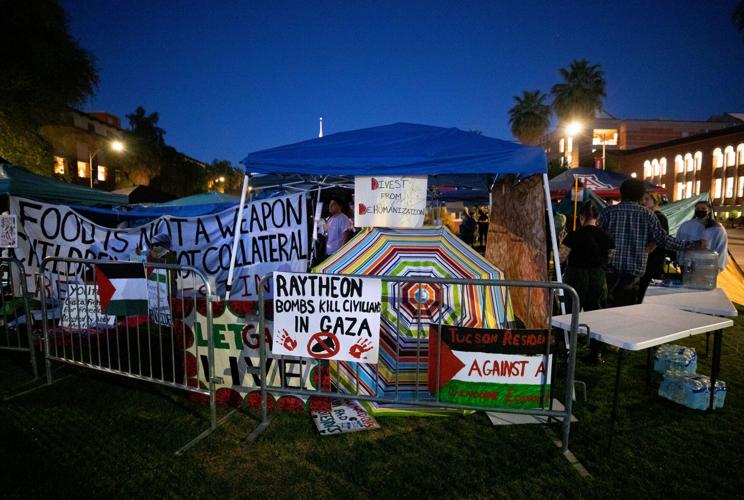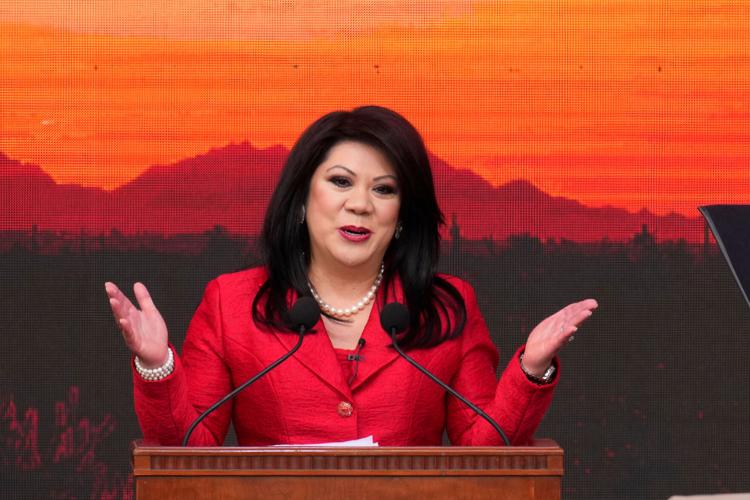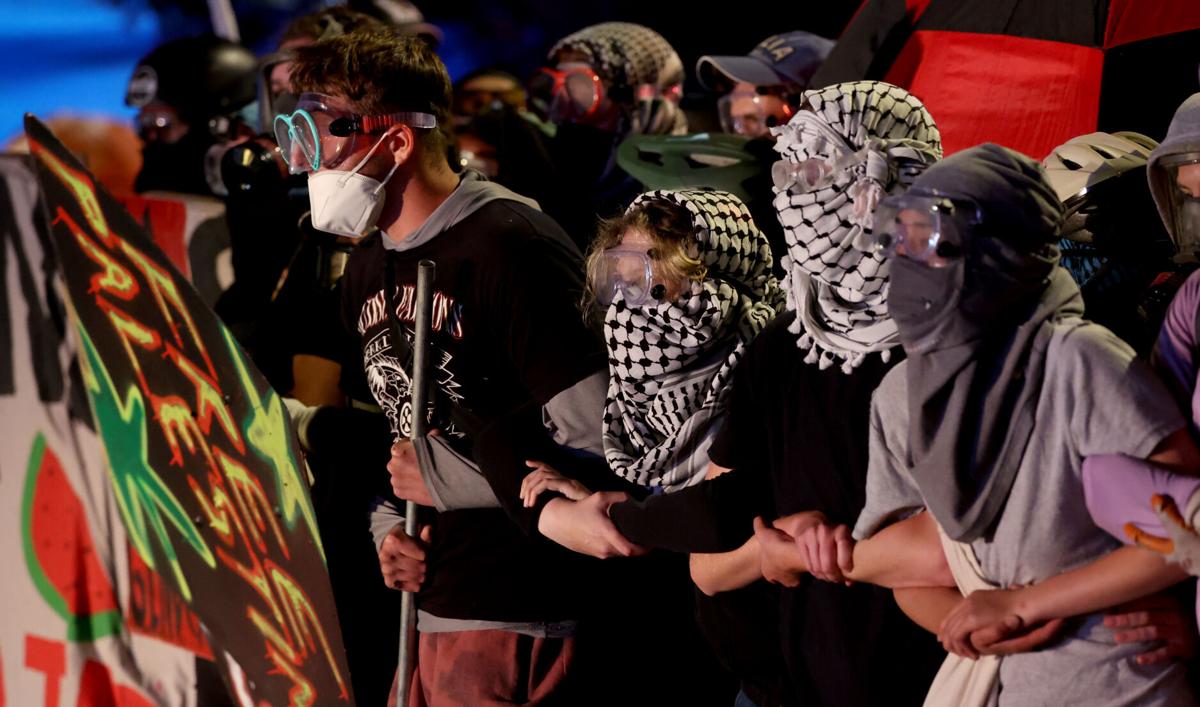The pro-Palestinian protesters at the University of Arizona said they were prepared for whatever the police response to their illegal encampment earlier this month would be.
They brought in helmets and drilled wooden pallets to secure their camp. They wore goggles for tear gas and went over what to do when they got arrested. The cause is that important to them, organizers said. One said they were willing to return and continually get arrested until the UA commits to divesting from Israel.
The problem? It’s illegal for the university to do so.
Arizona is one of 38 states in the country with specific laws making it illegal for state agencies to divest from Israel. The bill prohibiting state and local governments from divesting was first signed into law in 2016, with an update in 2022 that specifically bars the state’s public universities and community colleges from divesting.
“Arizona and Israel have been longtime allies and trade partners, as has been the United States of America with Israel,” said Kimberly Yee, the state’s treasurer, who is a Republican elected to the post and a former state senator who worked on the 2016 legislation.
“These types of bills are intended to support our friends (in) Israel as well as to continue to partner with them in a way that would protect their economic viability and stability, as well as really acknowledge their sovereignty,” Yee said.
What does divestment mean?
In simple terms, divestment means selling holdings deemed questionable. An example was when universities, buckling to the demands of student protesters in the 1980s, sold stock of companies that did business with South Africa when it was an apartheid state.

The sun sets on an encampment organized by a group called Students Against Apartheid on the University of Arizona campus on April 29.
Divesting from Israel can mean a plethora of things. The Students Against Apartheid group, which has organized the encampments and leads the divestment effort at the UA, is demanding the university divest from all companies “profiting from the occupation of Palestine, the genocide of people in the Gaza strip,” but also diverges widely to add in “the militarization of the US/Mexico borderlands/unceded O’odham and Pascua Yaqui territories.”
The group is also demanding that the UA disclose all financial connections to Israel and to weapons manufacturing, including to Tucson-based Raytheon Missiles & Defense.
A spokesperson for the university declined to comment for this article but in the past has said the UA’s senior leadership team is aware of the demands.
Do protesters know UA can’t meet their demands?
The encampment organizers are aware of the state law prohibiting public universities from divesting from Israel, a media spokesperson told the Star. But they contend the law itself is illegal.
“It’s such a blatant violation of the First Amendment it’s almost laughable,” said Max, a graduate student at the UA who would not give his last name, saying he fears retaliation. “The only reason it’s still standing is that nobody has appealed it in its current form. I would urge the university to break this law and appeal it.”
Max added that the group decided to camp out at the university and not, for example, the state Capitol, because they are “more focused on what’s happening at the UA.” He said that if the university were to break state law and divest, he thinks it would ultimately win an appeal.
How else has this law taken effect?
This is not the first time divestment has been an issue in Arizona, though more recently, the state decided to divest from a company because of its pro-Palestinian roots.

Arizona Treasurer Kimberly Yee
In 2021, as state treasurer, Yee divested $143 million from all state-related investments involving Unilever, the parent company of Ben and Jerry’s ice cream company, after the sweet treats business decided to boycott Israel by refusing to sell their product in the West Bank.
Yee said that after she pulled out from Unilever, other states, including New York and Florida, followed suit.
In October, Yee increased the state’s holdings of Israel bonds after the Oct. 7 Hamas attack on Israel, Chamber Business News reported. At that point, the Arizona State Treasurer’s Office had about $15 million in holdings in Israel bonds, much of which were purchased under Yee, the publication said.
Although she supports making political investment decisions such as the Unilever choice, Yee has spoken out against judging investments based on corporations’ environmental, social and governance policies.
She said the state treasurer’s office has a recent policy affirming it will not make investment decisions “from a social perspective.”
“I’ve always said that these types of policies do not belong in the investment space because they really do affect the consumer,” Yee said. “We just want to make money.”
Pro-Palestinian protestors at the University of Arizona retreat after arrests.
Photos: Police break up second pro-Palestinian encampment on University of Arizona campus
Pro-Palestine protests
Updated
Demonstrators retreat along University Boulevard in a cloud of teargas and taking hits from pepper balls as several area law enforcement agencies use chemical ammunition to clear an encampment of pro-Palestinian demonstrators off the University of Arizona campus, May 10, 2024, Tucson, Az.
Pro-Palestine protests
Updated
Demonstrators use homemade shields to fend off some of the pepper balls fired at them by law enforcement as pro-Palestinian protestors are pushed off the University of Arizona campus and west on University Boulevard, May 10, 2024, Tucson, Az.
Pro-Palestine protests
Updated
A demonstrator carries a street barricade, one of several protestors took to buttress the walls of their encampment of pro-Palestinian protestors on the University of Arizona campus, May 9, 2024, Tucson, Az.
Pro-Palestine protests
Updated
Law enforcement officers toss and kick away obstacles on Park Avenue left by retreating demonstrators as several area law enforcement clear an encampment of pro-Palestinian demonstrators off the University of Arizona campus, May 9, 2024, Tucson, Az.
Pro-Palestine protests
Updated
A line of demonstrators form a line to confront the area law enforcement agencies marching towards them near the intersection of Park Avenue and University Boulevard, May 10, 2024, Tucson, Az.
Pro-Palestine protests
Updated
Demonstrators retreats in a cloud of tear gas as several area law enforcement agencies clear an encampment of pro-Palestinian demonstrators off the University of Arizona campus, May 10, 2024, Tucson, Az.
Pro-Palestine protests
Updated
Arizona Department of Public Safety officers stop and don gas masks and riot helmets as they prepare to clear an encampment of pro-Palestinian demonstrators off the University of Arizona campus, May 9, 2024, Tucson, Az.
Pro-Palestine protests
Updated
A law enforcement officer pulls the pin on a tear gas canister while clearing an encampment of pro-Palestinian demonstrators off the University of Arizona campus, May 10, 2024, Tucson, Az.
Pro-Palestine protests
Updated
An officer fires a chemical ammunition round into a cluster of demonstrators while clearing an encampment of pro-Palestinian demonstrators off the University of Arizona campus, May 10, 2024, Tucson, Az.
Pro-Palestine protests
Updated
A line of several area law enforcement agencies stands at the intersection of University Boulevard and Park Avenue after ejecting a small group of pro-Palestinian demonstrators off the University of Arizona campus, May 10, 2024, Tucson, Az.
Pro-Palestine protests
Updated
A demonstrator claps to music in an encampment of pro-Palestinian demonstrators on the University of Arizona campus, May 9, 2024, Tucson, Az.
Pro-Palestine protests
Updated
Demonstrators hold a sign for traffic along Park Avenue outside an encampment of pro-Palestinian protestors on the University of Arizona campus, May 9, 2024, Tucson, Az.
Pro-Palestine protests
Updated
A demonstrator hauls in a pair of barricades appropriated to help reinforce the walls of an encampment of pro-Palestinian demonstrators on the University of Arizona campus, May 9, 2024, Tucson, Az.
Pro-Palestine protests
Updated
A demonstrator shines a laser into the faces of photographers watching an encampment of pro-Palestinian demonstrators on the University of Arizona campus, May 9, 2024, Tucson, Az.
Pro-Palestine protests
Updated
Officers from several area law enforcement agencies form a line and advance on an encampment of pro-Palestinian demonstrators on the University of Arizona campus, May 9, 2024, Tucson, Az.
Pro-Palestine protests
Updated
A demonstrator watches one line of law enforcement advance on the encampment of pro-Palestinian protestors at the University of Arizona, May 9, 2024, Tucson, Az.
Pro-Palestine protests
Updated
Demonstrators form a line as they prepare to face off with hundreds of law enforcement officers pushing them out of their encampment at the University of Arizona, May 9, 2024, Tucson, Az.
Pro-Palestine protests
Updated
Demonstrators lock arms after retreating out of their encampment as law enforcement officers push them down Park Avenue and off the University of Arizona campus, May 10, 2024, Tucson, Az.
Pro-Palestine protests
Updated
A demonstrator yells towards the law enforcement officers clearing an encampment of pro-Palestinian protestors at the University of Arizona, May 10, 2024, Tucson, Az.
Pro-Palestine protests
Updated
An organizer speaks to an encampment of pro-Palestinian demonstrators preparing to face off with law enforcement on the University of Arizona campus, May 9, 2024, Tucson, Az.
Pro-Palestine protests
Updated
A couple walks past graffiti on the wall of a Main Gate Square business after law enforcement forced a knot of pro-Palestinian demonstrators off the University of Arizona, May 10, 2024, Tucson, Az.
Pro-Palestinian protest
Updated
Two pro-Palestinian protesters organized set up a barrier to an encampment on the University of Arizona campus in Tucson, Ariz. on May 9, 2024. Police broke up the camp hours later.
Pro-Palestinian protest
Updated
A woman takes photos of pro-Palestinian protesters as they march on the University of Arizona campus and set up an encampment in Tucson, Ariz. on May 9, 2024.
Pro-Palestinian protest
Updated
Pro-Palestinian protesters organized push back on University of Arizona police as staff tried to set up flood lights on an encampment on the University of Arizona campus in Tucson, Ariz. on May 9, 2024. Police broke up the camp hours later.
Pro-Palestinian protest
Updated
Pro-Palestinian protesters set up tents for an encampment at the olive grove on the University of Arizona campus in Tucson, Ariz. on May 9, 2024. Police broke up the camp hours later.
Pro-Palestinian protest
Updated
Pro-Palestinian protesters organized by Students Against Apartheid march down University Blvd. to the University of Arizona campus in Tucson, Ariz. on May 9, 2024. Protesters set up another encampment which police broke up hours later.
Pro-Palestinian protest
Updated
A single pro-Palestinian protester walks down University Blvd. towards other marchers as they make their way to the University of Arizona campus in Tucson, Ariz. on May 9, 2024. The protesters set up another encampment, but it was broken up by police hours later.
Pro-Palestinian protest
Updated
Pro-Palestinian protesters organized by Students Against Apartheid gather in Catalina Park then marched to the University of Arizona campus and set up an encampment in Tucson, Ariz. on May 9, 2024.
Pro-Palestinian protest
Updated
Pro-Palestinian protesters stand along a wall at the olive grove on the University of Arizona campus and set up an encampment in Tucson, Ariz. on May 9, 2024. Police broke up the camp hours later.
Pro-Palestinian protest
Updated
An organizer speaks to pro-Palestinian protesters gathered at the olive grove on the University of Arizona campus in Tucson, Ariz. on May 9, 2024.
Pro-Palestinian protest
Updated
Pro-Palestinian protesters bring in supplies to set up an encampment at the olive grove on the University of Arizona campus in Tucson, Ariz. on May 9, 2024. Police broke up the camp hours later.
Pro-Palestinian protest
Updated
A University of Arizona police officer yells out to pro-Palestinian protesters that they will be arrested for trespassing as they set up an encampment at the olive grove on campus in Tucson, Ariz. on May 9, 2024.
Pro-Palestinian protest
Updated
A pro-Palestinian protester stands along Park Ave. near the olive grove at the University of Arizona campus in Tucson, Ariz. on May 9, 2024.
Pro-Palestinian protest
Updated
Pro-Palestinian protesters organized by Students Against Apartheid gathered in Catalina Park then marched to the University of Arizona campus and set up an encampment in Tucson, Ariz. on May 9, 2024.
Pro-Palestinian protest
Updated
Pro-Palestinian protesters set up an encampment at the olive grove on the University of Arizona campus in Tucson, Ariz. on May 9, 2024. Police broke up the camp hours later.







